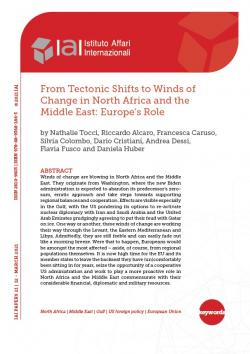From Tectonic Shifts to Winds of Change in North Africa and the Middle East: Europe’s Role
Winds of change are blowing in North Africa and the Middle East. They originate from Washington, where the new Biden administration is expected to abandon its predecessor’s zero-sum, erratic approach and take steps towards supporting regional balances and cooperation. Effects are visible especially in the Gulf, with the US pondering its options to re-activate nuclear diplomacy with Iran and Saudi Arabia and the United Arab Emirates grudgingly agreeing to put their feud with Qatar on ice. One way or another, these winds of change are working their way through the Levant, the Eastern Mediterranean and Libya. Admittedly, they are still feeble and can easily fade out like a morning breeze. Were that to happen, Europeans would be amongst the most affected – aside, of course, from regional populations themselves. It is now high time for the EU and its member states to leave the backseat they have (un)comfortably been sitting in for years, seize the opportunity of a cooperative US administration and work to play a more proactive role in North Africa and the Middle East commensurate with their considerable financial, diplomatic and military resources.
-
Details
Rome, IAI, March 2021, 15 p. -
In:
-
Issue
21|12 -
ISBN/ISSN/DOI:
978-88-9368-186-5
Introduction
1. Seeds of reconciliation
2. The Biden factor
3. Where is Europe?
References



